| Srl | Item |
| 1 |
ID:
069584
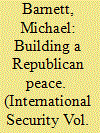

|
|
|
| 2 |
ID:
134525
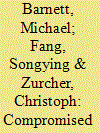

|
|
|
|
|
| Summary/Abstract |
There is considerable evidence that peacebuilding operations are more likely to reproduce important elements of the status quo than they are to propel post-conflict states toward a liberal democracy. In contrast to existing theories that focus on the resources available to peacebuilders or the degree of damage caused by the war to explain the outcome, we highlight the interaction between international and domestic actors. Specifically, we conceive of peacebuilding as a strategic process involving peacebuilders, a postwar government, and other local elites. The equilibrium results show that this process typically concludes in a compromised peacebuilding outcome. This is not surprising when the policy preferences of the actors diverge, but the results also hold when domestic elites prefer a liberal democracy to the status quo. Why? Primarily, because postwar governments are rewarded by relatively impatient peacebuilders with more resources than they would otherwise receive. Additionally, if there exists a secondary elite with veto power, a compromised outcome becomes even more likely. We illustrate these findings with reference to post-1989 peacebuilding operations. Although peacebuilding might not work as it is intended, in the conclusion, we argue that it is better than the alternatives and propose a more realistic measure of peacebuilding success.
|
|
|
|
|
|
|
|
|
|
|
|
|
|
|
|
| 3 |
ID:
066923
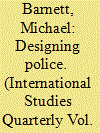

|
|
|
| 4 |
ID:
092083
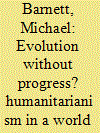

|
|
|
|
|
| Publication |
2009.
|
| Summary/Abstract |
Many theories of international relations contain a narrative of progress and explain that progress with reference to evolutionary imagery. This article examines critically: the relevance of Darwinian and Lamarckian models of international relations to the evolution of international ethics and institutions; and the possibility that the ethics and norms are likely to be more consistent with existing world orders than challengers to it. Specifically, this article draws from evolutionary social science and organizational theory to develop a framework to explore the initial diversity of the meaning and practices of humanitarianism; how the combination of environmental mechanisms and organizational culture led many humanitarian agencies to adapt to their environment in ways that incorporated politics; and the subsequent countermovement by some agencies who wanted to purify humanitarianism. I then apply this framework to explain the recent history of four international aid agencies. I conclude with several observations regarding how the model as applied to these cases allows us to examine critically the selection mechanisms that do and do not account for ethical change and how scholars of international norms, ethics, and progress should be attentive to how principled actors are creatures of the world they want to transform.
|
|
|
|
|
|
|
|
|
|
|
|
|
|
|
|
| 5 |
ID:
177070


|
|
|
|
|
| Summary/Abstract |
Most explanations for the crisis of the liberal order revolve around geopolitics, globalization, economic resentment fueling new forms of populism and nationalism, and Western states following their interests away from liberal values and institutions of their creation. But international orders are produced and legitimated by both material and spiritual forces. The spirit in liberalism is moral progress defined by practices of humanity. If the Liberal International Order (LIO) is in decline, then perhaps we should consider its moral foundations. Section “Introduction” briefly introduces the question of international order, categorizes international relations theories according to the mixture of consent and coercion, and how legitimacy often refers not only to the existing order but a vision of progress. This is particularly true of the liberal international order. Section “International Order, Legitimacy, and Progress” turns to the liberal international order, progress, and the possible spiritual decline of the liberal international order. After briefly considering the liberal in international liberalism and the late 20th-century emergence of the liberal international order, I argue that one reason for its declining moral foundations is because of the pronounced individualism that resides at the heart of the contemporary international order. In other words, the sources of decline are not exogenous but rather part of liberalism. The Conclusion asks: what is next? The conjunction of the decline of the LIO and COVID-19 has complicated the debate about the future international order, and much of the conversation hinges on whether and how the United States can recover from its self-destructive tendencies and China’s intentions. But where is the spirit of moral progress and humanity in this discussion?
|
|
|
|
|
|
|
|
|
|
|
|
|
|
|
|
| 6 |
ID:
060947
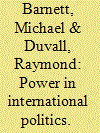

|
|
|